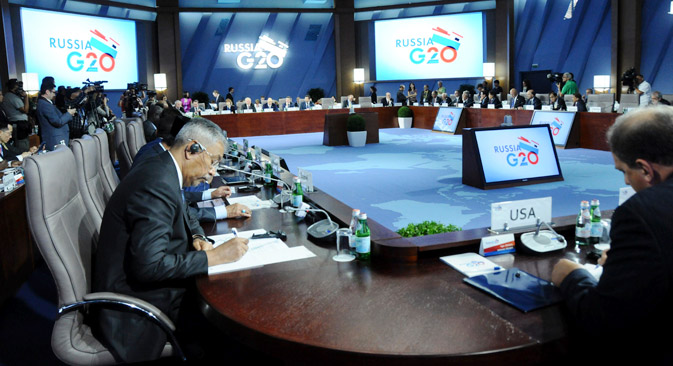
The G20 summit will focus on discussing such issues as the state of the global economy, reforming the world’s currency system and corruption. Source: Reuters / Vostock Photo
One week before the opening of the G20 Summit in St. Petersburg, its host, Russian President Vladimir Putin, disclosed some information about the planned agreements. When it ascended to the G20 chairmanship back in December 2012, Russia announced that its main goal was the “concentration of G20 efforts on developing measures to stimulate economic growth and creation of new jobs.”
The ways to achieve these goals are primarily through the encouragement of investments, effective regulation, increased trust and market transparency.
In light of these priorities, the St. Petersburg summit will focus on discussing such issues as the state of the global economy, promoting employment, reforming the world’s currency system and the financial regulation and supervision system, stability of global energy markets, strengthening of multilateral trade, and combating protectionism and corruption.
Russia will propose two new topics for discussion: the funding of investments as the basis for economic growth and creating more jobs, as well as the modernization of national state borrowing systems and sovereign debt management.
“We have worked most responsibly on every point of the declared agenda and are coming to this summit with a large set of agreements,” read Putin’s speech for the summit. Among the most important agreements, he mentioned coordinated measures in combating tax evasion.
In the president’s words, the plan developed by the G20 — with support from OECD — is the biggest step in the improvement and coordination of tax policies undertaken in the last 100 years. In advance of this decision, most offshore zones have already spoken about reducing bank secrecy.
Among other innovations introduced by Russia as the chair of the summit, there is a joint meeting of the ministers of finance and the ministers of labor from G20 member states. This is the first time that public officials from different countries will work together.
This new approach has already paid off, as it has helped connect macroeconomic and financial policy issues with the tasks of social protection and creation of more jobs, as well as enabled discussion of measures to promote the employment of youth and vulnerable categories of people.
“An important role in improving the transparency and efficiency of our work is played by the intensive dialogue between the Russian chairmanship and all interested parties — countries that are not G20 member states, regional alliances and international organizations, business, trade unions, civil society, youth and expert centers.
G20 leaders say yes to investment, no to tax evasion
G20 will need to make decisions on investment, financial sector regulation - Putin
We took every effort to take into consideration all interesting and useful recommendations and suggestions from our outreach partners,” said Putin in his speech.
Speaking about Russia’s achievements, the president noted the report on performance of obligations in promoting development that the G20 had previously undertaken. This is a large document, which is to become the foundation for a new plan known as the St. Petersburg Development Strategy.
This strategy was presented to the media on Aug. 28 by the Russian representatives at the G20. They emphasized that this is the first report of its kind in the five-year history of G20 summits. The document analyzes the performance of the 2010 Seoul summit decisions.
According Ksenia Yudaeva, head of Russia’s Presidential Experts' Directorate, 33 of the 67 undertaken obligations have been performed, while work on another 33 obligations continues. Then again, the performance of one obligation has been suspended: the development of a power-generating and transportation infrastructure.
Sergei Storchak, Russia’s deputy minister of finance, quoted funding volumes: The G20 countries spend up to $100 billion annually to support developing economies; to this amount, Russia contributes about $500 million.
To a question from RBTH concerning which regions Russia will favor in its aid programs, Andrei Bokarev, chief of the international financial organizations department at the Russian Ministry of Finance, said the largest amount of funding is directed to Eastern Europe and Central Asia.
Other recipients of large aid portions include South-East Asia, the Middle East and African territories south of the Sahara Desert.
Answering a question about particular results that should be expected from the St. Petersburg summit, Yudaeva told RBTH: “The leaders will approve the Declaration and Action Plans in the Main Lines of G20 Activities. This includes 10–12 addenda and a list of documents that is one page long.”
In addition, the summit will approve a draft action plan for the G20 Summit in 2014, when Australia will take over the chairmanship. Next year, Russia will chair the G8 Summit. No doubt, this will be a unique opportunity for the country to introduce its priorities, amendments and recommendations to the global agenda.
All rights reserved by Rossiyskaya Gazeta.
Subscribe
to our newsletter!
Get the week's best stories straight to your inbox